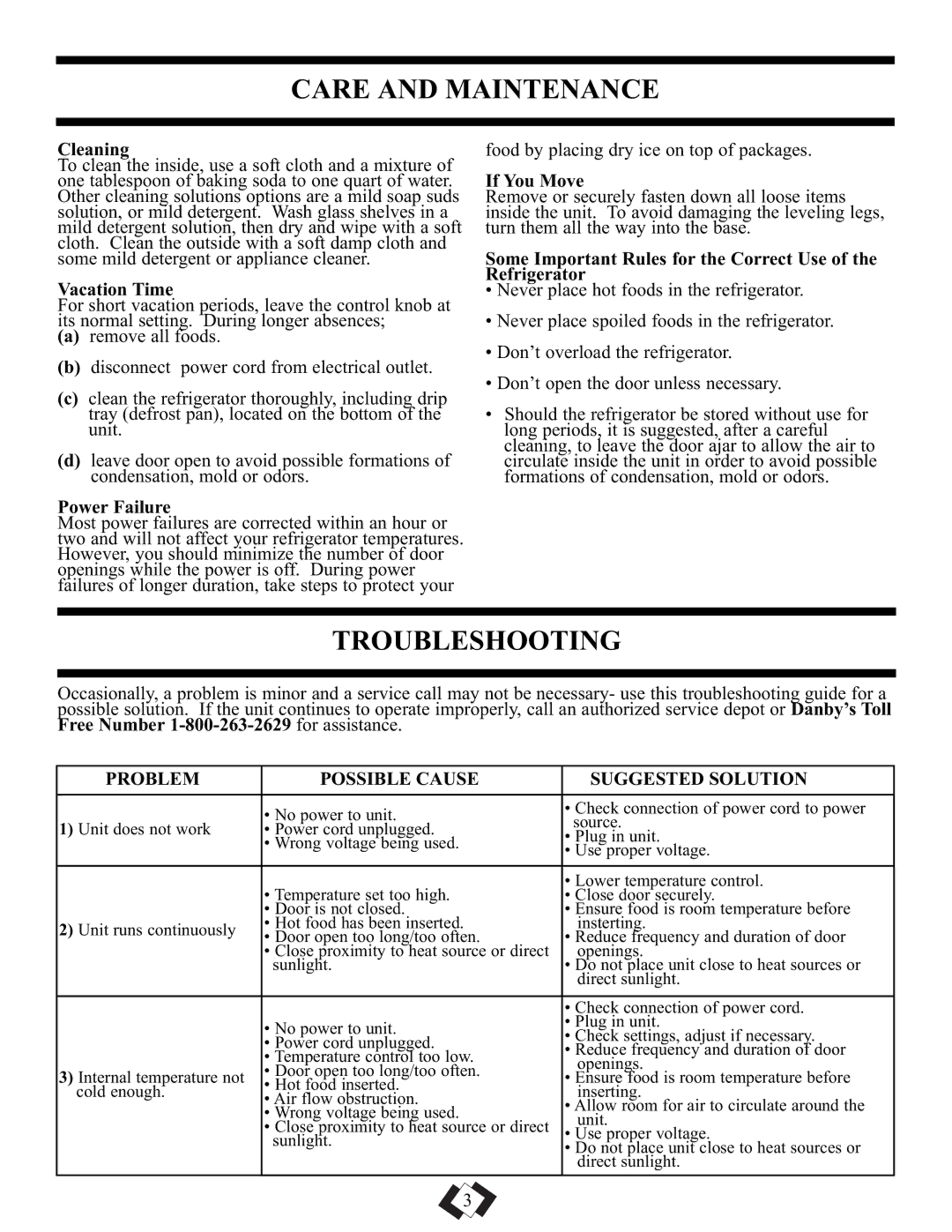
CARE AND MAINTENANCE
Cleaning
To clean the inside, use a soft cloth and a mixture of one tablespoon of baking soda to one quart of water. Other cleaning solutions options are a mild soap suds solution, or mild detergent. Wash glass shelves in a mild detergent solution, then dry and wipe with a soft cloth. Clean the outside with a soft damp cloth and some mild detergent or appliance cleaner.
Vacation Time
For short vacation periods, leave the control knob at its normal setting. During longer absences;
(a)remove all foods.
(b)disconnect power cord from electrical outlet.
(c)clean the refrigerator thoroughly, including drip tray (defrost pan), located on the bottom of the unit.
(d)leave door open to avoid possible formations of condensation, mold or odors.
Power Failure
Most power failures are corrected within an hour or two and will not affect your refrigerator temperatures. However, you should minimize the number of door openings while the power is off. During power failures of longer duration, take steps to protect your
food by placing dry ice on top of packages.
If You Move
Remove or securely fasten down all loose items inside the unit. To avoid damaging the leveling legs, turn them all the way into the base.
Some Important Rules for the Correct Use of the Refrigerator
•Never place hot foods in the refrigerator.
•Never place spoiled foods in the refrigerator.
•Don’t overload the refrigerator.
•Don’t open the door unless necessary.
•Should the refrigerator be stored without use for long periods, it is suggested, after a careful cleaning, to leave the door ajar to allow the air to circulate inside the unit in order to avoid possible formations of condensation, mold or odors.
TROUBLESHOOTING
Occasionally, a problem is minor and a service call may not be necessary- use this troubleshooting guide for a possible solution. If the unit continues to operate improperly, call an authorized service depot or Danby’s Toll Free Number
PROBLEM | POSSIBLE CAUSE | SUGGESTED SOLUTION | |
|
|
| |
| • No power to unit. | • Check connection of power cord to power | |
1) Unit does not work | source. | ||
• Power cord unplugged. | |||
• Plug in unit. | |||
| • Wrong voltage being used. | ||
| • Use proper voltage. | ||
|
| ||
|
|
| |
| • Temperature set too high. | • Lower temperature control. | |
| • Close door securely. | ||
| • Door is not closed. | • Ensure food is room temperature before | |
2) Unit runs continuously | • Hot food has been inserted. | insterting. | |
• Door open too long/too often. | • Reduce frequency and duration of door | ||
| |||
| • Close proximity to heat source or direct | openings. | |
| sunlight. | • Do not place unit close to heat sources or | |
|
| direct sunlight. | |
|
|
| |
|
| • Check connection of power cord. | |
| • No power to unit. | • Plug in unit. | |
| • Check settings, adjust if necessary. | ||
| • Power cord unplugged. | ||
| • Reduce frequency and duration of door | ||
| • Temperature control too low. | ||
| openings. | ||
3) Internal temperature not | • Door open too long/too often. | ||
• Ensure food is room temperature before | |||
cold enough. | • Hot food inserted. | inserting. | |
• Air flow obstruction. | |||
| • Allow room for air to circulate around the | ||
| • Wrong voltage being used. | ||
| unit. | ||
| • Close proximity to heat source or direct | ||
| • Use proper voltage. | ||
| sunlight. | • Do not place unit close to heat sources or | |
|
| direct sunlight. | |
|
|
|
3
